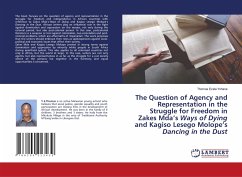
Esther Summerson's Struggle for Identity
Versandkostenfrei!
Versandfertig in 6-10 Tagen
32,99 €
inkl. MwSt.

PAYBACK Punkte
16 °P sammeln!
In the preface to Bleak House, Charles Dickens wrote that he purposely dwelt upon the romantic side of familiar things (xxxv). This simple sentence hints at the narrative outline of the book, establishing a third-person omniscient narrator of familiar things, and the first-person narrative of Esther Summerson, whose task it was to write about the romantic side of things. Although not universally the case, most critics consider the omniscient narrator to be a powerful, compelling voice, but find Esther s voice to be somehow ineffective.
In the preface to Bleak House, Charles Dickens wrote
that he purposely dwelt upon the romantic side of
familiar things (xxxv). This simple sentence hints
at the narrative outline of the book, establishing a
third-person omniscient narrator of familiar
things, and the first-person narrative of Esther
Summerson, whose task it was to write about
the romantic side of things. Although not
universally the case, most critics consider the
omniscient narrator to be a powerful, compelling
voice, but find Esther s voice to be somehow
ineffective.
that he purposely dwelt upon the romantic side of
familiar things (xxxv). This simple sentence hints
at the narrative outline of the book, establishing a
third-person omniscient narrator of familiar
things, and the first-person narrative of Esther
Summerson, whose task it was to write about
the romantic side of things. Although not
universally the case, most critics consider the
omniscient narrator to be a powerful, compelling
voice, but find Esther s voice to be somehow
ineffective.












